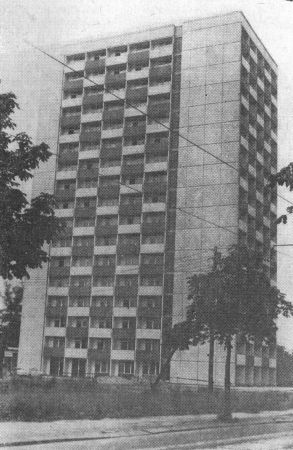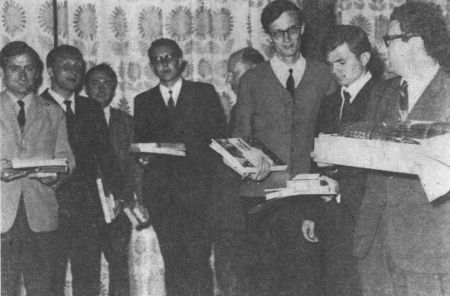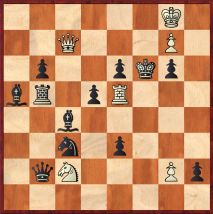The XVIth World Student Chess Team Championship was held from August 1 to 17, 1969, in Dresden, GDR. Together with the International Union of Students, the co-organisers were the chess federation and the university student sports organisation of the GDR.
A new record was set in the number of competing teams. Compared to last year when the Championship was played in Ybbs (Austria) and attended by 25 teams, this year the number rose to 26. Among the new participants, taking part in this Championship for the first time, were students from the Dominican Republic and the Philippines. This confirms once again that the World Student Chess Team Championship has won great popularity among students of the whole world and the name "little chess Olympics" suits it perfectly.
 The ceremonial opening of this year's Championship was held an August 1 in the Dresden city hall. In the presence of the Minister of Education, Prof. Dr. Ernst-Joachim Giessmann, and the Vice-President of the GDR sports organisation DTSB, Prof. Dr. Edelfrid Buggel, the participants were greeted by the chairman of the organising committee of the Championship and chairman of the student sports organisation of the GDR, Dr. Heinz Meurer. He was followed by the chairman of the GDR chess federation Armin Heintze. In the name of the International Union of Student, the participants were welcomed by the head of the IUS Sports Department Miroslav Chmelik. Then in the name of FIDE, I greeted the "participants and organisers and declared the XVIth World Student Chess Team Championship in Dresden underway.
The ceremonial opening of this year's Championship was held an August 1 in the Dresden city hall. In the presence of the Minister of Education, Prof. Dr. Ernst-Joachim Giessmann, and the Vice-President of the GDR sports organisation DTSB, Prof. Dr. Edelfrid Buggel, the participants were greeted by the chairman of the organising committee of the Championship and chairman of the student sports organisation of the GDR, Dr. Heinz Meurer. He was followed by the chairman of the GDR chess federation Armin Heintze. In the name of the International Union of Student, the participants were welcomed by the head of the IUS Sports Department Miroslav Chmelik. Then in the name of FIDE, I greeted the "participants and organisers and declared the XVIth World Student Chess Team Championship in Dresden underway.
A technical consultation was held the next morning with the captains of the teams and at this meeting the teams were divided into preliminary groups. In the afternoon the matches began.
 The struggle in these preliminary groups was very dramatic and until the very last moment it was not clear who would reach the top final group, i. e. the A group. In every preliminary group there usually were three teams that stood a real chance of moving up to the A group. There were five preliminary groups and the first two teams of each moved into the final A group, the next two into the B group and the last into the C group. In the first preliminary group the winner was the USSR team with a big lead over its nearest rivals — a lead of 6 whole points. But the fight for second place between Romania and Iceland was bitter to the very end. Finally the Romanian students won by half a point.
The struggle in these preliminary groups was very dramatic and until the very last moment it was not clear who would reach the top final group, i. e. the A group. In every preliminary group there usually were three teams that stood a real chance of moving up to the A group. There were five preliminary groups and the first two teams of each moved into the final A group, the next two into the B group and the last into the C group. In the first preliminary group the winner was the USSR team with a big lead over its nearest rivals — a lead of 6 whole points. But the fight for second place between Romania and Iceland was bitter to the very end. Finally the Romanian students won by half a point.
In the second preliminary group the victory of the West German students was an easy matter but a tense struggle developed between Scandinavian rivals, Denmark and Sweden, for second place. Although the Swedes surprisingly beat their Danish colleagues 3-1, their unexpected defeat in the last match with France and the unawaited victory of Denmark over the BRD, meant that the Danish students moved up to the final A group.
The most balanced group was the third. In that one all four teams were fighting hard to make the A final group and the difference in points between the teams was really minimal. In the final matches the USA, by playing the Philippines to a tie 2-2, advanced. Since Israel did not succeed in winning over Scotland by a convincing 4-0 score, which it needed to move up, apart from the Americans the British reached the final A group.
 In group four there was a pitched battle to advance fought by three teams, the GDR, Norway and Czechoslovakia. In the first two rounds the Norwegians scored 4-0 wins twice whereas Czechoslovakia lost to the GDR by 2½-1½ and the GDR then tied Cuba 2-2. The decision was reached only in the last two rounds when the GDR sovereignly defeated the Norwegians by the high score of 3-1 and in the last round Czechoslovakia's 2½-1½ victory over the Norwegians sufficed for it too to move up among the Big Ten. In the final scoring both the GDR and Norway show 10½ points each but in using the second criterion — that is the number of matches won — the students of the GDR were more successful. They managed to play Cuba to a tie whereas the Norwegians lost two matches, to the GDR and to Czechoslovakia.
In group four there was a pitched battle to advance fought by three teams, the GDR, Norway and Czechoslovakia. In the first two rounds the Norwegians scored 4-0 wins twice whereas Czechoslovakia lost to the GDR by 2½-1½ and the GDR then tied Cuba 2-2. The decision was reached only in the last two rounds when the GDR sovereignly defeated the Norwegians by the high score of 3-1 and in the last round Czechoslovakia's 2½-1½ victory over the Norwegians sufficed for it too to move up among the Big Ten. In the final scoring both the GDR and Norway show 10½ points each but in using the second criterion — that is the number of matches won — the students of the GDR were more successful. They managed to play Cuba to a tie whereas the Norwegians lost two matches, to the GDR and to Czechoslovakia.
In the fifth group the fight was the clearest. The advance of the Yugoslavs and Bulgarians was only to be expected. So, in the final A group the matches were played to decide places 1 to 10, in group B for places from 11 to 20 and in group C for 21st to 26th place.
The fight in the final group for first place and also for the championship title of the world was an absolutely foregone conclusion. At the very outset, the Soviet students took the lead in their group and continued to 'strengthen it in the course of the matches, winning very convincingly with a lead of 5½ points over second-place winners, the Yugoslavs. Thus the Soviets retained their title from last year and marked their 12th, victory in this tournament. Their great superiority was evident even from the results at the individual chessboards. In group A the winner at the second chessboard was Podgaets, at the fourth board Georgadze, at the fifth Averkin and the sixth Kupreichik.
In the fight for second place, or for the silver medal, surprisingly successful were the Yugoslav students. They had no well-known stars on their team but they fought with great enthusiasm and deservedly came in second. Ljubojević was the winner at the third chessboard.
Bulgarian students also made a good showing and took third place, thereby winning the bronze medal. Bulgarian player Spassov became the individual winner of the first chessboard of group A.
Fourth place was taken by the students of the German Federal Republic who gained the same score as the Bulgarian students but in using the criterion of matches won they were in fact less successful than their colleagues. The GFR's fourth place in this tournament is, to a certain extent, a disappointment in view of the fact that at last year's tournament it earned as many points as the Soviet winners and the title went to the latter only because they had won more games. The GFR team this year lacked its No. 1 player Pfleger and the other members of the team were not up to top form.
Fifth place, thanks to a better score in numbers of games won, went to the students and country which had sponsored this tournament, the GDR. This marks a big advance for these students and their victory can be attributed mainly to their leading player Espig, who gained 7½ points at the first chessboard out of 13 matches, and Schöneberg who scored 8½ points out of 13 matches at the second chessboard.
 Sixth place was taken by the pleasant students from Britain and seventh went to the USA. It was expected that the latter would be out in front fighting for one of the medals but as was the case they were not up to standard. The placing of Romanian students corresponds to the overall level of their games during the tournament. The last two teams in the first ten, Denmark and Czechoslovakia, had the same number of points - but, based on the system of winning games, the Danes had a better showing and so they took ninth place, and tenth then went to Czechoslovakia. This is the worst showing the Czechoslovaks have ever made in this world championship in which they have taken part since its inception. The team clearly felt the loss of its leading player, Smejkal, who last year was the individual winner at the 1st chessboard.
Sixth place was taken by the pleasant students from Britain and seventh went to the USA. It was expected that the latter would be out in front fighting for one of the medals but as was the case they were not up to standard. The placing of Romanian students corresponds to the overall level of their games during the tournament. The last two teams in the first ten, Denmark and Czechoslovakia, had the same number of points - but, based on the system of winning games, the Danes had a better showing and so they took ninth place, and tenth then went to Czechoslovakia. This is the worst showing the Czechoslovaks have ever made in this world championship in which they have taken part since its inception. The team clearly felt the loss of its leading player, Smejkal, who last year was the individual winner at the 1st chessboard.
In the group B finals the first two places were taken by students from Israel and Hungary, who had the same number of points. Since Israel had a better score in winning games it took first place in this group. Iceland was third and the Norwegians fourth. The Austrians and Cubans had good and poor showings and the same can be said about the Finns and the Swedes. The Philippine team, which had surprised everyone the its excellent matches in the preliminary group, could not withstand the pace physically and its lack of international experience also became evident.
In group C the Scottish students won quite easily over their French rivals.
During the Championship an interesting steamboat trip was arranged for the participants on August 6 along the Elbe River to the picturesque region of Saxonian-Switzerland. In the evening the captains of the individual teams were the guests of the Mayor of Dresden.
On August 14 the participants in the Championship were the guests of several factories in Dresden. They were given an opportunity to learn about production programmes and the life of the people working in these factories.
 During the Championship the press and radio paid very close attention to the matches and the hall where they were played was quite well attended when one takes into consideration that tropical weather conditions prevailed. The ceremonial end of the Championship and the distribution of prizes took place on Sunday, August 17, in the hall of the Technical University. After speeches and the distribution of prizes, the Vice-President of FIDE, Dr. Wilfried Dorazil, declared that the XVIth World Student Chess Team Championship in Dresden had come to an end.
During the Championship the press and radio paid very close attention to the matches and the hall where they were played was quite well attended when one takes into consideration that tropical weather conditions prevailed. The ceremonial end of the Championship and the distribution of prizes took place on Sunday, August 17, in the hall of the Technical University. After speeches and the distribution of prizes, the Vice-President of FIDE, Dr. Wilfried Dorazil, declared that the XVIth World Student Chess Team Championship in Dresden had come to an end.
It can be said that it ended with full success, both organisationally and from the point of view of sport. Credit and thanks for this goes in first place to the organisers of the Championship, the chess federation and student sports organisation of the GDR. The director of the tournament, Dr. Gerhard Schmidt, and his collaborators, and the main referee of the Championship Zakhary Stanchev, also contributed to the smooth course of the matches which were held without a single serious problem requiring solution. During the Championship the participants displayed a great feeling of sportsmanship and thus contributed to the tournament's success.
The World Championship in Dresden also contributed to the further strengthening of friendly relations among chess-playing students of the whole world in the spirit of the traditional FIDE motto: "Gens una sumus".
/ Engineer Jaroslav Šajtar, Vice-President of FIDE /
